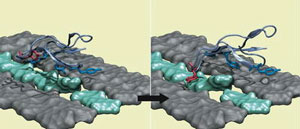San Francisco becomes the largest city in the nation to switch to a 20% biodiesel blend for all of its city vehicles. This comes as the area’s first public biodiesel pumps open (see my post from April 19th). Check out this release from the National Biodiesel Board:
“Every city bears responsibility for taking local action to address our global climate crisis, and vehicle emissions are a major source of greenhouse gases,” said Mayor Newsom. “When it comes to the use of alternative fuels, renewable energy sources and greening our city fleet, San Francisco is demonstrating leadership and commitment on every front.”
 “The city of San Francisco departments have announced various strategies using biodiesel to reduce air pollution and greenhouse gases, and to use local resources to produce biofuels,” said Randall von Wedel, a biochemist representing the National Biodiesel Board (NBB) in state regulatory affairs, based in the San Francisco area. “We are grateful to Mayor Newsom for his initiative,” said von Wedel, “and we hope that San Francisco will serve as a model for other large cities on how to make a difference in reducing air pollution, greenhouse gases and dependence on petroleum fuel.”
“The city of San Francisco departments have announced various strategies using biodiesel to reduce air pollution and greenhouse gases, and to use local resources to produce biofuels,” said Randall von Wedel, a biochemist representing the National Biodiesel Board (NBB) in state regulatory affairs, based in the San Francisco area. “We are grateful to Mayor Newsom for his initiative,” said von Wedel, “and we hope that San Francisco will serve as a model for other large cities on how to make a difference in reducing air pollution, greenhouse gases and dependence on petroleum fuel.”
City officials also announced their “Biofuel Recycling Program,” today. Under the program, waste grease and cooking oil will be collected from area restaurants. Biodiesel plants in the area will turn the separated cooking oils into biodiesel, and the grease will be made into methane gas to power electric generators for San Francisco.


 The vice chairman of General Motors says converting automobiles to ethanol is “entirely realistic.”
The vice chairman of General Motors says converting automobiles to ethanol is “entirely realistic.” Scientists have used an SDSC supercomputer to help improve cellulose conversion to ethanol.
Scientists have used an SDSC supercomputer to help improve cellulose conversion to ethanol.  Top international experts meeting in Rome last week agreed that bioenergy could be a positive force for rural development
Top international experts meeting in Rome last week agreed that bioenergy could be a positive force for rural development 
 The latest update from explorer/environmentalist Will Steger comes from Earth Day (this past Sunday) on Baffin Island in the Canadian Arctic. As you might remember from our previous posts, Steger is leading a team of three other explorers and educators and four native Inuits on a four-month-long, dog-sled expedition across the island.
The latest update from explorer/environmentalist Will Steger comes from Earth Day (this past Sunday) on Baffin Island in the Canadian Arctic. As you might remember from our previous posts, Steger is leading a team of three other explorers and educators and four native Inuits on a four-month-long, dog-sled expedition across the island.
 Kansas City consumers can follow in the footsteps of the IndyCar® Series and make a choice at the pump for energy independence and cleaner air. E10, a blend of 90 percent gasoline and 10 percent ethanol, will be available for $2.14, the average qualifying speed for the Indy 300 at Kansas Speedway, on Thursday at two locations in the greater Kansas City metropolitan area and #17 Team Ethanol Driver Jeff Simmons will be signing autographs.
Kansas City consumers can follow in the footsteps of the IndyCar® Series and make a choice at the pump for energy independence and cleaner air. E10, a blend of 90 percent gasoline and 10 percent ethanol, will be available for $2.14, the average qualifying speed for the Indy 300 at Kansas Speedway, on Thursday at two locations in the greater Kansas City metropolitan area and #17 Team Ethanol Driver Jeff Simmons will be signing autographs. The
The  EPA Administrator Stephen L. Johnson calls the nation’s first comprehensive Renewable Fuels Standard, or RFS, “a hat trick – it protects the environment, strengthens our energy security, and supports America’s farmers.”
EPA Administrator Stephen L. Johnson calls the nation’s first comprehensive Renewable Fuels Standard, or RFS, “a hat trick – it protects the environment, strengthens our energy security, and supports America’s farmers.”